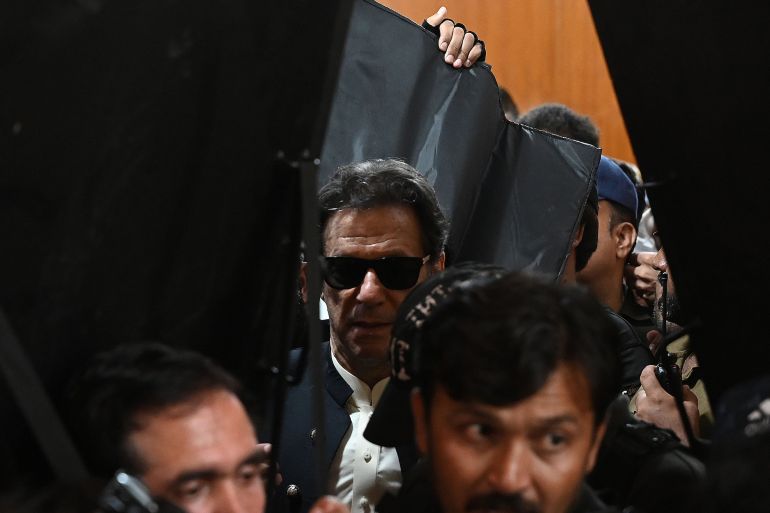Sixteen civilians face military trial in Pakistan over protests
Sixteen civilians to be tried in military courts in connection with the violence that followed former PM Khan’s arrest.

A court in the eastern Pakistani city of Lahore has handed 16 civilians to the military for trial over their suspected involvement in violent protests this month following the arrest of former Prime Minister Imran Khan.
The military said the suspects handed over on Thursday would be tried in its courts, which are primarily used to try enemies of the state.
Recommended Stories
list of 4 items- list 1 of 4Ex-PM Khan’s PTI jolted by more resignations
- list 2 of 4Pakistan considering banning Imran Khan’s party: Defence minister
- list 3 of 4‘Forced divorce’: Leaders leaving Imran Khan party amid crackdown
- list 4 of 4Pakistan’s Imran Khan gets bail from anti-terrorism court
Khan was arrested on May 9. His supporters rampaged through cities, setting fire to buildings, blocking roads and clashing with police outside military installations during unrest in which nine people were killed.
Khan walked free from three days of custody after the Supreme Court declared the arrest illegal.
The former national cricket captain is embroiled in the latest, critical phase of a decades-old rivalry between civilian politicians and the powerful military, which has ruled directly or overseen governments throughout Pakistan’s history.
Rights monitors said authorities have detained thousands of supporters of Khan’s Pakistan Tehreek-e-Insaf (PTI) party since days of street violence erupted over his arrest.
Amnesty International on Tuesday said, “A pall of fear hangs over Khan’s supporters following the arbitrary arrests of many opposition leaders.”
“Authorities must stop clamping down on the political opposition,” Amnesty said in a joint statement with other organisations, accusing the government of using “vague anti-terrorism laws” to justify its crackdown.
Since he was ousted from office in a vote of no confidence last year, 70-year-old Khan has waged an unprecedented campaign of defiance against the powerful military. It has ruled the South Asian nation for almost half its history through three coups and has long been regarded as Pakistan’s powerbrokers.
Khan accuses the top brass of orchestrating his downfall and even plotting a November assassination attempt in which he was shot in the leg, allegations that the army denies.
His arrest on graft charges at the Islamabad High Court came just hours after he repeated the claim.
The military has denied claims by Khan that “agencies” planned the violence to smear his party.
One of the 16 suspects is a member of the PTI and had been chosen by Khan to run in the next provincial elections, according to a senior member of Khan’s legal team.
Military courts operate under a separate system from the civilian legal system. Trials are closed to outsiders, and no media is allowed. Rights groups have criticised the secretive nature of the process.
The protests coincided with Pakistan’s worst economic crisis in decades with record high inflation, anaemic growth and IMF funding delayed for months, prompting concerns that the country could default on its external payment obligations.